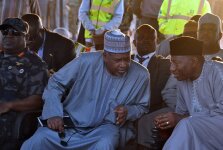Guinea’s former military leader, Moussa Dadis Camara, said on Monday he would seek the presidency in October’s election as the candidate for a newly created party, Patriotic Forces for Democracy and Development.
Camara, who ruled the West African country for almost year after seizing power in a 2008 coup, said that President Alpha Conde could not prevent him from returning and contesting the election.
Camara remains popular in his native Forest region of southeast Guinea, but his reputation in Conakry, the country’s capital, was tarnished by a massacre carried out by soldiers during his rule. At least 157 people were killed in September 2009 in the capital.
“President Alpha Conde, who was elected and who I respect, cannot refuse me: he cannot forbid me from returning to the country of my birth,” Camara told a news conference in the capital of neighbouring Burkina Faso. “The suffering of the Guinean people has lasted too long.”
Camara’s support in the Forest region could make him an important power-broker in the presidential polls, particularly if they go to a second round between Conde and his main rival, Cellou Dalein Diallo, observers say.
Some 2,000 women on Friday took to the streets of Nzerekore, the largest city of the Forest region, more than 900 km (540 miles) southeast of Conakry, to demand Camara’s return.
Camara has lived in exile in Burkina Faso since resigning the presidency in late 2009 after he was shot in the head in an assassination attempt organised by his aide de camp. He returned to Guinea briefly for his mother’s funeral in Nzerekore in 2013.
The former army captain resigned from the military last month, his lawyer said.
His decision to contest the presidency comes amid mounting tensions in Guinea after a month of protests. The opposition says a decision announced in March to hold Guinea’s presidential election on Oct. 11 broke a 2013 agreement to stage long-delayed local elections first.
The opposition says that winning control of some local authorities would provide it with a better platform from which to contest the presidency.
One opposition leader, Mouctar Diallo, said that Camara had the right to contest the election, but first a thorough investigation into the September 2009 massacre should be concluded.
The opposition’s principal leaders – including Cellou Dalein Diallo, now the head of the main opposition party, the Union of Democratic Forces of Guinea, and Sidya Toure – were beaten by soldiers during the massacre at a political rally. Dozens of women were also raped.




